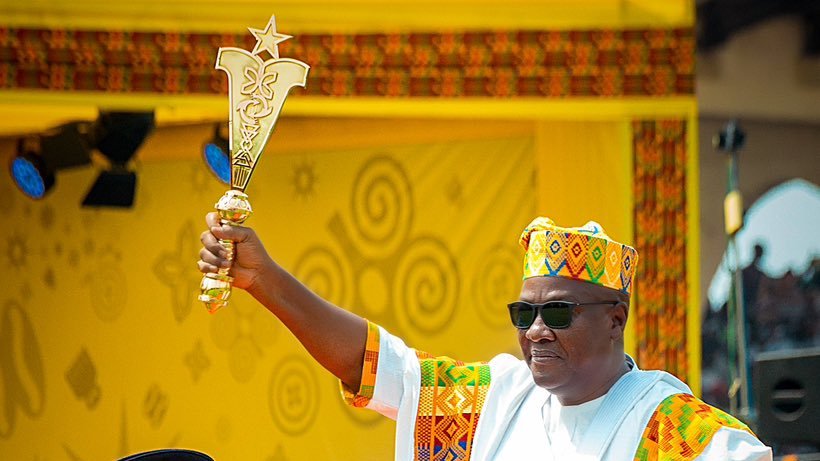John Dramani Mahama made a historic return to the presidency, but his promise to reset the Ghanaian economy to fix the shortcomings of the erstwhile Akufo-Addo government carries high stakes. The journey ahead demands tough choices.
Tough choices that must balance social relief with fiscal discipline in the midst of mounting pressure to deliver on the numerous promises made to the electorate. But the country’s economy has been battered both on the domestic and international fronts, the worst of it being a total shut-out from the international capital market.
Fixing this will require urgent recalibration , but can Mahama 2.0 lead Ghana out of its current economic quagmire?
John Mahama’s victory, just like that of his predecessor President Nana Akufo-Addo, was won on the back of ambitious policies targeted at stimulating job creation, economic growth, and industrialisation. While Akufo-Addo promised one-district-one-factory, Mahama has promised the 24-hour economy. For policies like the Year of Roads, One-District-One-Dam, and Agenda 111, which promised massive infrastructural investment in the erstwhile government, Mahama has proposed the Big Push, and so on.
In spite of all the grand promises, the past administration was marked by prolonged currency volatility, rising inflation, high cost of living, stifled private sector growth, and unsustainable debt levels. Worse still, external shocks like the COVID-19 pandemic and global commodity price fluctuations exposed structural weaknesses in the economy, forcing a $3 billion International Monetary Fund (IMF) bailout.
Even as Mahama assembles his team to deliver on his promises, many of the issues that got the erstwhile NPP government booted out still linger and could threaten the success of his reset agenda.
Aware of this reality, President Mahama’s first major move is a national economic dialogue for stakeholder engagement to unpick the challenges and align public needs with government policies.
At a period when public debt sits at more than 70% to GDP, nothing could be timelier. A dialogue is a good start. After the talk comes the inevitable heavy lifting. Debt servicing, including the double whammy of the Domestic Debt Exchange Programme (DDEP) and External Debt Restructuring alone, currently accounts for nearly half of government’s annual revenue. Consequently, the country’s debt stock remains profoundly unsustainable.
Mahama’s first budget to be presented in March is not only a critical test of his policy intentions but also an economic balancing act of improving domestic revenue while yet, removing unpopular taxes such as the E-Levy, Betting tax and COVID-19 Levy.With an apparent potential loss in revenue, it waits to be seen whether the government’s ‘priority of priorities’ – easing the burden on consumers and businesses – will deliver the needed growth to justify the act itself.
This is especially because there isn’t until now, any clear direction of alternatives to fill the multi-billion-cedi hole expected to be created by the scrapping of these tax handles.
Without sustained revenue, the huge energy sector debt, for example, can not be cleared, and the cycle of poor program implementation and infrastructure implementation will continue. As finance minister Dr Cassiel Ato Forson eyes raising tax revenue-to-GDP ratio from 13.8% to 16%,he faces a big question of how and the maiden budget should answer this.
Mahama’s handling of the local currency will be important. Investors, businesses, and ordinary citizens alike are keen to see clear plans and actions that will stabilise the cedi’s performance against other major trading currencies. Whether through foreign direct investment, strategic commodity exports, and regulation through its Gold Board initiative, for example, or even building strong buffers with the reserves at the Bank of Ghana, nothing should be off the table.
In the midst of all these, there is growing uncertainty about the future of the current IMF programme as President Mahama and his finance minister Dr. Ato Forson contradict each other on whether the programme may be extended or not. With or without an extension, there is a strong appetite to review the programme. This may mean flexibility in fiscal targets to allow for more growth-oriented spending. Care is to be taken so as to not vitiate the resurging investor confidence brought by the change of government, however small that confidence is.
For many Ghanaians, Mahama and the National Democratic Congress’ (NDC) return is a good sign for the economy. The oversubscription in treasury bills and the massive rejections in some of the bids may well be a foretelling of what the reset agenda may bring. But such is the goodwill that comes with new governments and Mr Mahama must learn from errors of the one-time shining economic star of Africa called Ghana – which was the world’s fastest growing economy in 2019 – and be prudent.
Yes, Ghana’s economy needs a reset to deliver an improved standard of living and prosperity for all. But Mr Mahama’s true test lies ahead – Can he turn the promise of a reset into a sustainable economic rebound for Ghana? Only time will tell. In the meantime, I wish the government well.
